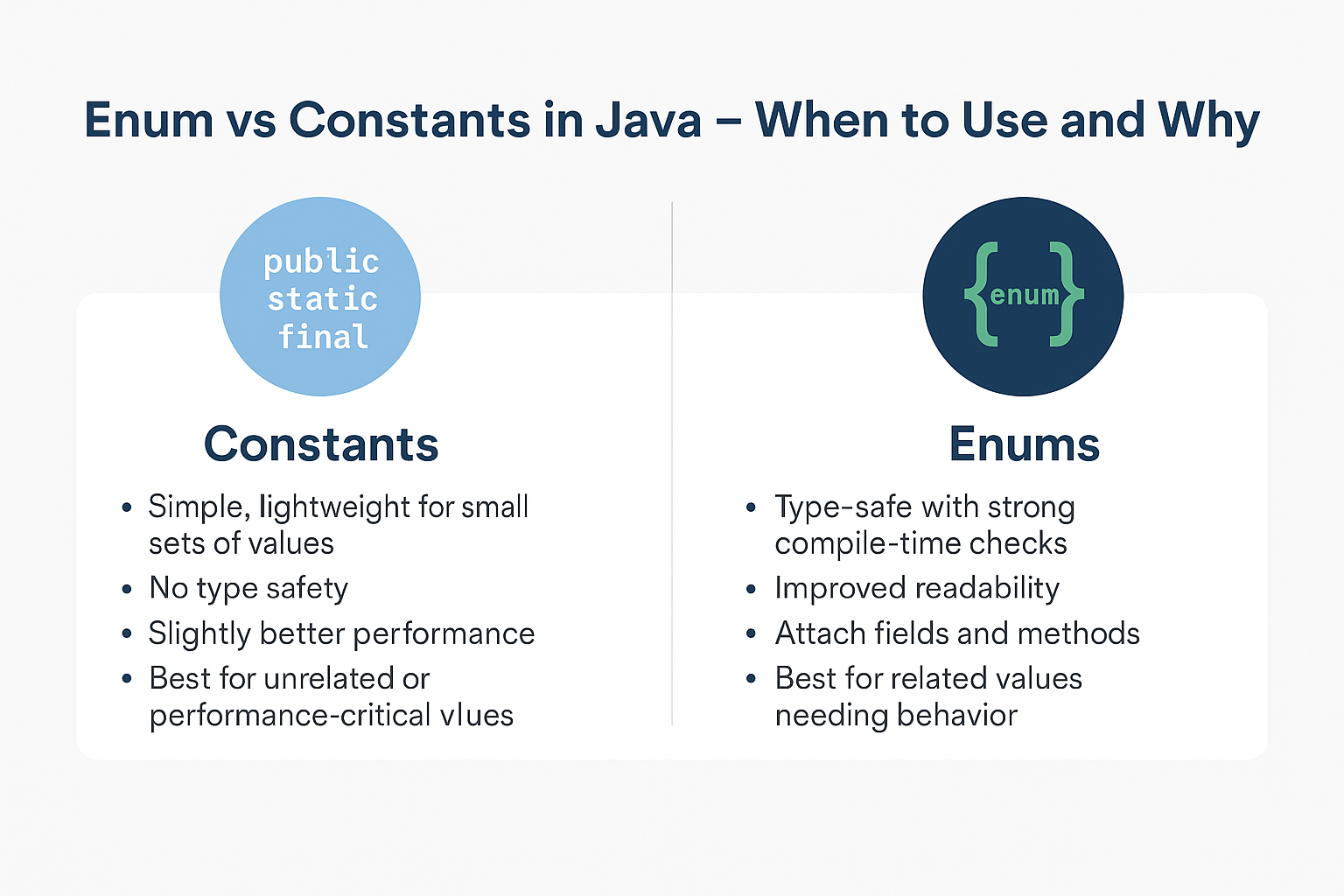Introduction
In Java, you can represent fixed values using either constants (public static final) or enums. Choosing the right approach impacts readability, maintainability, and type safety.
Why It Matters
- Enums provide compile-time type checking and additional features.
- Constants are simple and lightweight for small sets of values.
- Using the right tool prevents bugs and improves code clarity.
When to Use
- Enums: For a fixed set of related values that need type safety or behavior.
- Constants: For simple, unrelated, or performance-critical values.
Core Concepts
Constants (Static Final)
public class Status {
public static final int PENDING = 0;
public static final int APPROVED = 1;
public static final int REJECTED = 2;
}
Usage:
if (status == Status.APPROVED) {
System.out.println("Approved");
}
Enums
public enum StatusEnum {
PENDING, APPROVED, REJECTED;
}
if (statusEnum == StatusEnum.APPROVED) {
System.out.println("Approved");
}
Comparison Table
| Feature | Constants | Enums |
|---|---|---|
| Type Safety | No | Yes |
| Readability | Medium | High |
| Attach Fields/Methods | No | Yes |
| Compile-time Checking | Limited | Strong |
| Performance | Slightly faster | Slight overhead |
| Extensibility | Difficult | Easy |
Real-World Analogy
- Constants are like sticky notes with values written on them; anyone can misplace or duplicate them.
- Enums are like a predefined dropdown list in a form; you can only select valid options.
Real-World Use Cases
- Constants:
- Mathematical constants (
PI,E). - Global configuration keys.
- Mathematical constants (
- Enums:
- User roles (
ADMIN,USER). - States (
PENDING,APPROVED,REJECTED). - Fixed sets with behavior (e.g., operations with methods).
- User roles (
Common Mistakes & Anti-Patterns
-
Using constants for state machines:
- Leads to invalid combinations and lack of type safety.
-
Adding behavior to constants:
- Use enums with methods instead.
-
Mixing constants of different types in one class:
- Makes code harder to maintain.
Performance & Memory Implications
- Constants:
- Lightweight; no object creation.
- Suitable for high-performance scenarios.
- Enums:
- Singleton objects; minimal overhead.
- Safer and easier to maintain in large codebases.
Best Practices
- Use enums for related fixed values with potential behavior.
- Use constants for independent values (e.g., limits, keys).
- Keep enums immutable and focused.
- Use
EnumSet/EnumMapfor collections of enums.
Java Version Relevance
| Version | Change |
|---|---|
| Java 5 | Enums introduced |
| Java 7+ | Enums supported in switch statements |
| Java 8+ | Lambdas and streams integrate well with enums |
Code Example: Enum with Behavior
public enum Operation {
ADD {
public int apply(int a, int b) { return a + b; }
},
MULTIPLY {
public int apply(int a, int b) { return a * b; }
};
public abstract int apply(int a, int b);
}
Usage:
int result = Operation.ADD.apply(2, 3);
System.out.println(result); // 5
Conclusion & Key Takeaways
- Enums offer type safety, readability, and behavior attachment.
- Constants are simple and efficient for standalone values.
- Use enums for related sets of constants; use constants for independent values.
FAQ
-
What’s the main difference between enums and constants?
Enums are type-safe classes; constants are static final variables. -
Do enums have runtime overhead?
Minimal, as they are singleton objects. -
Can enums have methods?
Yes, unlike constants. -
Are enums better than constants always?
Not always; use based on context. -
Can enums implement interfaces?
Yes, they can. -
Are constants faster than enums?
Slightly, due to no object overhead. -
Can enums be extended?
No, they implicitly extendEnum. -
When should I use constants instead of enums?
For unrelated or performance-critical values. -
Can enums be used in switch statements?
Yes, from Java 5 onwards. -
Are enums immutable?
Yes, they are inherently immutable.
